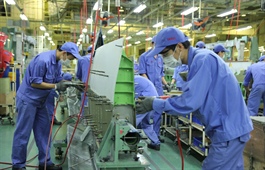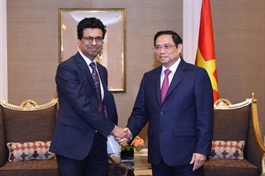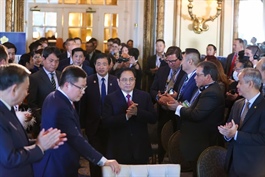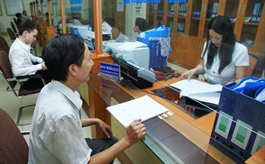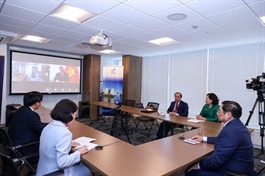Vietnam’s economic outlook remains bright: AMRO
Vietnam’s economic outlook remains bright: AMRO
Vietnam’s positive outlook rides on strong external demand, a recovery in domestic consumption, and healthy investment inflows.
Vietnam’s economic prospects would remain bright with the GDP growth expected to expand at 6.3% in 2022 and 6.5% in 2023.

Overview of the meeting between AMRO's representative and the State Bank of Vietnam. |
This preliminary assessment was made by the ASEAN+3 Macroeconomic Research Office (AMRO) after its Annual Consultation Visit to Vietnam from May 3-18, 2022.
The mission was led by AMRO Group Head and Lead Economist, Sanjay Kalra. AMRO Director, Toshinori Doi, and Chief Economist, Hoe Ee Khor participated in the policy meetings.
The discussions focused on the recovery of the Vietnamese economy from the pandemic and made policy recommendations to further support the recovery while maintaining macroeconomic stability and creating conditions for sustainable and inclusive growth over the medium term.
According to Kalra, “such a positive outlook rides on strong external demand, a recovery in domestic consumption and healthy investments inflows, bolstered by an appropriate macroeconomic policy stance.”
In this context, Kalra noted that inflation is projected to remain contained this year at below 3.5%, within the 4% target set by the Government, as the authorities plan to utilize their oil price stabilization fund and administered prices to offset pressures emanating from global developments in energy prices.
AMRO’s report, however, noted Vietnam’s economy continues to face risks from global commodity and supply chain disruptions related to geopolitical developments, flare-ups of more vaccine-resistant Covid-19 variants, China’s zero-Covid policy, tightening of financial conditions in advanced economies, and a persistent increase in global oil prices.
From a longer-term perspective, the pandemic may have widened inequalities with longer-lasting scars on the more vulnerable segments of society, noted the report.
In the financial sector, the deterioration in bank balance sheets from the effects of the pandemic-related growth slowdown would likely take some time to mend. Relatedly, potential risks from the real estate sector warrant close monitoring in the near-to-medium term.
Structural reform required for sustainable growth
To further aid the economic recovery process, AMRO recommends a mildly supportive fiscal policy stance in 2022.
Given the available fiscal space and the uneven recovery across economic and social sectors, policy should provide targeted support to those that continue to be dislocated by the pandemic, especially micro-, small and medium-sized enterprises (MSMEs) and low-income households, it noted.
Monetary conditions should be normalized to contain inflationary pressures and reduce financial imbalances that emerged in the environment of low-interest rates. However, it is essential to ensure that the financing needs of vulnerable MSMEs and households are met and that sufficient funding is available to productive sectors.
The State Bank of Vietnam should continue to allow greater exchange rate flexibility, as it balances growth, inflation, and financial sector stability objectives stated AMRO.
On the financial stability front, efforts are needed to increase provisioning and capital buffers to prepare for an increase in impaired assets, given the impending expiry of the forbearance policy. A macroprudential policy framework needs to be put in place, including addressing imbalances in the real estate market.
“As Vietnam progresses beyond the lower middle-income country status, it will need to implement reforms across a broad range of issues and sectors to mobilize financing for growth and development and to strengthen investor confidence,” stated AMRO
In this context, the Prime Minister’s directive to raise Vietnam’s sovereign rating in international capital markets to investment grade by 2030 is a step in the right direction, it continued.
Structural reforms need to be accelerated to ensure sustainable and inclusive growth, including by expediting equitization of and divestment from state-owned enterprises (SOEs); developing domestic FDI supporting industries through training and skills upgrading programs; and strengthening the social safety net in anticipation of aging demographic trends.








